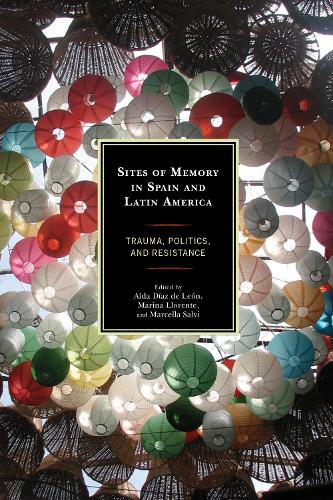
Sites of Memory in Spain and Latin America: Trauma, Politics, and Resistance
(Paperback)
Available Formats
Publishing Details
Sites of Memory in Spain and Latin America: Trauma, Politics, and Resistance
By (Author) Marina Llorente
Edited by Marcella Salvi
Edited by Ada Daz de Len
Contributions by Selfa A. Chew
Contributions by Martha I. Chew Snchez
Contributions by George Ciccariello-Maher
Contributions by Mallory Craig-Kuhn
Contributions by Ada Daz de Len
Contributions by Alfred Limas Hernndez
Contributions by Marina Llorente
Bloomsbury Publishing PLC
Lexington Books
27th August 2019
United States
Classifications
Professional and Scholarly
Non Fiction
European history
Politics and government
946
Physical Properties
Paperback
1
Width 152mm, Height 219mm, Spine 14mm
290g
Description
Sites of Memory in Spain and Latin America is a collection of essays that explores historical memory at the intersection of political, cultural, social, and economic forces in the contexts of Spain and Latin America. The essays here focus on a variety of forms of memoryfrom the most concrete to the performativethat resist forgetting and unite individuals against hegemonic memory. The volume comprises four thematic sections that focus on Chile, Spain, Argentina, Venezuela, Mexico, Peru, and the Dominican Republic. Keeping in line with the concept informing this collection, that the past returns politically to haunt the present, the four sections move from the contemporary context to the colonial and pre-Columbian eras in Latin America. For all its diversity, the researchers interdisciplinary methodology displayed in this collection brings to light processes that would otherwise have remained illegible under a more narrow interpretative approach to historical memory. This volume focuses on the processes of remembering in geographies that have been transformed by violence and conflict in Spain and Latin America. In the cases investigated witnessing, trauma, and testimony speak to the urgency of truth and justice; historical memory, therefore, is ultimately a political act.
Reviews
This excellent collection of essays reveals new and meaningful connections between the ways in which Spain and Latin America have been coming to terms with recent and not-so-recent violent pasts. The book not only makes the case for a Trans-Atlantic approach to memory studies in the Spanish-speaking world, but is also evidence of the specific contribution that literature, culture, and cultural criticism can make to the complex social processes that define individual and collective relationships with the past. -- Sebastiaan Faber, Oberlin College
Author Bio
Ada Daz de Len is visiting professor of Spanish in the Department of Modern Languages and Literatures at St. Lawrence University. Marina Llorente is professor of modern languages and literatures at St. Lawrence University. Marcella Salvi is associate professor of Italian and Spanish at St. Lawrence University.
